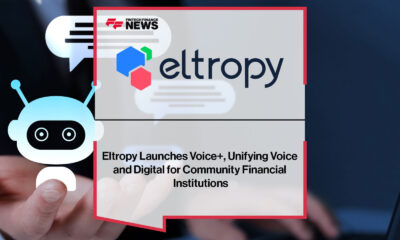Fintech
Eltropy’s new complete AI suite

Eltropiathe leading AI-powered conversation platform for community financial institutions (CFIs), today announced the general availability of the industry’s most advanced Safe-AI suite, built exclusively for credit unions and community banks. The comprehensive AI suite includes AI agents, AI assistants, and AI intelligence, designed to improve service, operational efficiency, and provide better conversation intelligence for credit unions and community banks.
Eltropy’s AI agents function as intelligent digital agents on websites and voice channels, efficiently providing members with accurate information through content analysis and interpretation. The agents can handle over 60% of common member inquiries, significantly improving self-service options. With the latest update, members can use generative AI to navigate websites more effectively, helping them find the right financial products in the credit union and community banking market.
Members or customers can enjoy the convenience of self-service capabilities, with the ability to easily hand the conversation off to a human agent without having to re-authenticate or restart the conversation.
AI assistants developed for employees across all departments, including loans, collections, branches, etc., provide quick access to internal knowledge bases. These assistants are designed to increase efficiency by reducing the need for staff to consult multiple sources or colleagues for information. With AI assistants, organizations can significantly accelerate onboarding and reduce training costs.
Complementing the AI suite, Eltropy AI provides powerful tools to analyze and improve interactions.
AI Intelligence focuses on AI conversation intelligence and quality assurance. It transcribes, summarizes, and scores nearly any member or customer conversation, providing customizable analytics that align to specific metrics. This enables deeper insights into factors that influence CSAT and NPS scores, improving monitoring and management capabilities for executives and contact center managers.
“Eltropy AI is specifically designed for the credit union technology stack, enabling seamless integration with core systems for member data and knowledge bases for frontline insights,” explained Saahil Kamath, AI Product Manager at Eltropy. “Integrates into online banking platforms and websites for easy navigation, fast resolution times, and secure transfers to agents when needed. It also integrates with most CCaaS systems of record to provide AI intelligence to automate quality assurance.”
In particular, Eltropy has implemented “Safe AI Guardrails” to ensure the responsible use of AI, including measures to reduce inaccurate information and maintain regulatory compliance. These guardrails help ensure that AI systems are developed and used responsibly, safely, ethically and in line with human values, incorporating technological, legal, ethical and regulatory considerations.
“These new AI tools are redefining how credit unions and community banks operate,” said Ashish Garg, co-founder and CEO of Eltropy. “We’ve seen firsthand the impact they’re having on everyday workflows and efficiency. AI isn’t just a fancy addition, it’s becoming essential to meeting modern expectations. AI assistants help employees tap into vast knowledge bases instantly, while members get faster, more accurate answers. It’s about using AI strategically to solve real problems and create better experiences for everyone.”
Saahil Kamath emphasized the collaborative and responsible approach to AI development: “We created these AI solutions not in isolation, but through continuous feedback from leaders and staff, ensuring they address the unique challenges of the industry,” he said. “Our new AI framework, with its ‘Safe AI Guardrails,’ focuses on trust, compliance and ethical use. By combining these safeguards with generative AI capabilities, we are providing reliable and effective tools that align with the values and regulatory standards of community financial institutions.”
The new offerings have been well received by credit unions and community banks. Magnifi Financial, an early adopter of the solution, reported a retention rate of more than 90% among employees using AI assistants during a six-month beta period.
“We are working with Eltropy to test these AI assistants. I am consistently impressed by how well they meet the needs of community financial institutions like ours,” said Brad Shafton, SVP, Digital & IT, Magnifi Financial. “The flexibility to display responses in multiple formats is fantastic. It allows our staff to choose how they want to view information based on what works best for them. I also love the ability to search through large documents, which is a huge time saver. These features will increase our first call resolution, improve the employee experience, and help new staff get up and running faster. Ultimately, this translates to a better experience for our members.”
This sentiment is shared by other early adopters at various credit unions. Kimberly Preston, Digital Project Manager at InRoads Credit Union, highlighted the improvements in efficiency and ease of use:
“This is a huge improvement over our previous system,” Preston said. “The AI is much more adaptable and easier to tune. If there’s a gap in its knowledge, we can quickly train it with existing materials or add new information. It’s been great for streamlining our processes and improving our response capabilities.”
Some credit unions have even found that Eltropy’s AI solution has proven more effective than general-purpose AI tools in their specific context. Adam Stevens, AVP, Digital Solutions at Eglin Federal Credit Union, provided a compelling comparison:
“We tested Eltropy’s AI against publicly available AI,” Stevens said. “I’ve asked the same questions of other popular generative AI bots and our own Eltropy bot, and Eltropy’s solution has consistently exceeded expectations. It’s not just matching the capabilities of general AI, it’s actually outperforming our specific credit union context.”
Eltropy’s Digital AI Agent and AI Assistant are available immediately for organizations looking to enhance their digital service capabilities. The company says the new tools can be deployed quickly with minimal disruption to existing operations. These tools incorporate a built-in Safe AI framework, which includes safeguards at the model, system, and application architecture levels. The framework also educates users on AI limitations and best practices.
For credit unions and community banks interested in exploring these AI solutions and other industry innovations, Eltropy will showcase its latest technologies at the upcoming Eltropy Leadership Summit in 2024. This event provides an opportunity for financial institutions to gain deeper insights into how AI can transform their operations and member services. Details and registration information for the summit are available at eltropy.com/eltropy-leadership-summit-2024.
As the financial services landscape continues to evolve, Eltropy’s AI suite represents a significant step forward in enabling credit unions and community banks to address the challenges of the digital age while maintaining their commitment to personalized service and community values.
Fintech
US Agencies Request Information on Bank-Fintech Dealings

Federal banking regulators have issued a statement reminding banks of the potential risks associated with third-party arrangements to provide bank deposit products and services.
The agencies support responsible innovation and banks that engage in these arrangements in a safe and fair manner and in compliance with applicable law. While these arrangements may offer benefits, supervisory experience has identified a number of safety and soundness, compliance, and consumer concerns with the management of these arrangements. The statement details potential risks and provides examples of effective risk management practices for these arrangements. Additionally, the statement reminds banks of existing legal requirements, guidance, and related resources and provides insights that the agencies have gained through their oversight. The statement does not establish new supervisory expectations.
Separately, the agencies requested additional information on a broad range of arrangements between banks and fintechs, including for deposit, payment, and lending products and services. The agencies are seeking input on the nature and implications of arrangements between banks and fintechs and effective risk management practices.
The agencies are considering whether to take additional steps to ensure that banks effectively manage the risks associated with these different types of arrangements.
SUBSCRIBE TO THE NEWSLETTER
And get exclusive articles on the stock markets
Fintech
What changes in financial regulation have impacted the development of financial technology?

Exploring the complex landscape of global financial regulation, we gather insights from leading fintech leaders, including CEOs and finance experts. From the game-changing impact of PSD2 to the significant role of GDPR in data security, explore the four key regulatory changes that have reshaped fintech development, answering the question: “What changes in financial regulation have impacted fintech development?”
- PSD2 revolutionizes access to financial technology
- GDPR Improves Fintech Data Privacy
- Regulatory Sandboxes Drive Fintech Innovation
- GDPR Impacts Fintech Data Security
PSD2 revolutionizes access to financial technology
When it comes to regulatory impact on fintech development, nothing comes close to PSD2. This EU regulation has created a new level playing field for market players of all sizes, from fintech startups to established banks. It has had a ripple effect on other markets around the world, inspiring similar regulatory frameworks and driving global innovation in fintech.
The Payment Services Directive (PSD2), the EU law in force since 2018, has revolutionized the fintech industry by requiring banks to provide third-party payment providers (TPPs) with access to payment services and customer account information via open APIs. This has democratized access to financial data, fostering the development of personalized financial instruments and seamless payment solutions. Advanced security measures such as Strong Customer Authentication (SCA) have increased consumer trust, pushing both fintech companies and traditional banks to innovate and collaborate more effectively, resulting in a dynamic and consumer-friendly financial ecosystem.
The impact of PSD2 has extended beyond the EU, inspiring similar regulations around the world. Countries such as the UK, Australia and Canada have launched their own open banking initiatives, spurred by the benefits seen in the EU. PSD2 has highlighted the benefits of open banking, also prompting US financial institutions and fintech companies to explore similar initiatives voluntarily.
This has led to a global wave of fintech innovation, with financial institutions and fintech companies offering more integrated, personalized and secure services. The EU’s leadership in open banking through PSD2 has set a global standard, promoting regulatory harmonization and fostering an interconnected and innovative global financial ecosystem.
Looking ahead, the EU’s PSD3 proposals and Financial Data Access (FIDA) regulations promise to further advance open banking. PSD3 aims to refine and build on PSD2, with a focus on improving transaction security, fraud prevention, and integration between banks and TPPs. FIDA will expand data sharing beyond payment accounts to include areas such as insurance and investments, paving the way for more comprehensive financial products and services.
These developments are set to further enhance connectivity, efficiency and innovation in financial services, cementing open banking as a key component of the global financial infrastructure.
General Manager, Technology and Product Consultant Fintech, Insurtech, Miquido
GDPR Improves Fintech Data Privacy
Privacy and data protection have been taken to another level by the General Data Protection Regulation (GDPR), forcing fintech companies to tighten their data management. In compliance with the GDPR, organizations must ensure that personal data is processed fairly, transparently, and securely.
This has led to increased innovation in fintech towards technologies such as encryption and anonymization for data protection. GDPR was described as a top priority in the data protection strategies of 92% of US-based companies surveyed by PwC.
Financial Expert, Sterlinx Global
Regulatory Sandboxes Drive Fintech Innovation
Since the UK’s Financial Conduct Authority (FCA) pioneered sandbox regulatory frameworks in 2016 to enable fintech startups to explore new products and services, similar frameworks have been introduced in other countries.
This has reduced the “crippling effect on innovation” caused by a “one size fits all” regulatory approach, which would also require machines to be built to complete regulatory compliance before any testing. Successful applications within sandboxes give regulators the confidence to move forward and address gaps in laws, regulations, or supervisory approaches. This has led to widespread adoption of new technologies and business models and helped channel private sector dynamism, while keeping consumers protected and imposing appropriate regulatory requirements.
Co-founder, UK Linkology
GDPR Impacts Fintech Data Security
A big change in financial regulations that has had a real impact on fintech is the 2018 EU General Data Protection Regulation (GDPR). I have seen how GDPR has pushed us to focus more on user privacy and data security.
GDPR means we have to handle personal data much more carefully. At Leverage, we have had to step up our game to meet these new rules. We have improved our data encryption and started doing regular security audits. It was a little tricky at first, but it has made our systems much more secure.
For example, we’ve added features that give users more control over their data, like simple consent tools and clear privacy notices. These changes have helped us comply with GDPR and made our customers feel more confident in how we handle their information.
I believe that GDPR has made fintech companies, including us at Leverage, more transparent and secure. It has helped build trust with our users, showing them that we take data protection seriously.
CEO & Co-Founder, Leverage Planning
Related Articles
Fintech
M2P Fintech About to Raise $80M

Application Programming Interface (API) Infrastructure Platform M2P Financial Technology has reached the final round to raise $80 million, at a valuation of $900 million.
Specifically, M2P Fintech, formerly known as Yap, is closing a new funding round involving new and existing investors, according to entrackr.com. The India-based company, which last raised funding two and a half years ago, previously secured $56 million in a round led by Insight Partners, earning a post-money valuation of $650 million.
A source indicated that M2P Fintech is ready to raise $80 million in this new funding round, led by a new investor. Existing backers, including Insight Partners, are also expected to participate. The new funding is expected to go toward enhancing the company’s technology infrastructure and driving growth in domestic and international markets.
What does M2P Fintech do?
M2P Fintech’s API platform enables businesses to provide branded financial services through partnerships with fintech companies while maintaining regulatory compliance. In addition to its operations in India, the company is active in Nepal, UAE, Australia, New Zealand, Philippines, Bahrain, Egypt, and many other countries.
Another source revealed that M2P Fintech’s valuation in this funding round is expected to be between USD 880 million and USD 900 million (post-money). The company has reportedly received a term sheet and the deal is expected to be publicly announced soon. The Tiger Global-backed company has acquired six companies to date, including Goals101, Syntizen, and BSG ITSOFT, to enhance its service offerings.
According to TheKredible, Beenext is the company’s largest shareholder with over 13% ownership, while the co-founders collectively own 34% of the company. Although M2P Fintech has yet to release its FY24 financials, it has reported a significant increase in operating revenue. However, this growth has also been accompanied by a substantial increase in losses.
Fintech
Scottish financial technology firm Aveni secures £11m to expand AI offering

By Gloria Methri
Today
- To come
- Aveni Assistance
- Aveni Detection
Artificial intelligence Financial Technology Aveni has announced one of the largest Series A investments in a Scottish company this year, amounting to £11 million. The investment is led by Puma Private Equity with participation from Par Equity, Lloyds Banking Group and Nationwide.
Aveni combines AI expertise with extensive financial services experience to create large language models (LLMs) and AI products designed specifically for the financial services industry. It is trusted by some of the UK’s leading financial services firms. It has seen significant business growth over the past two years through its conformity and productivity solutions, Aveni Detect and Aveni Assist.
This investment will enable Aveni to build on the success of its existing products, further consolidate its presence in the sector and introduce advanced technologies through FinLLM, a large-scale language model specifically for financial services.
FinLLM is being developed in partnership with new investors Lloyds Banking Group and Nationwide. It is a large, industry-aligned language model that aims to set the standard for transparent, responsible and ethical adoption of generative AI in UK financial services.
Following the investment, the team developing the FinLLM will be based at the Edinburgh Futures Institute, in a state-of-the-art facility.
Joseph Twigg, CEO of Aveniexplained, “The financial services industry doesn’t need AI models that can quote Shakespeare; it needs AI models that deliver transparency, trust, and most importantly, fairness. The way to achieve this is to develop small, highly tuned language models, trained on financial services data, and reviewed by financial services experts for specific financial services use cases. Generative AI is the most significant technological evolution of our generation, and we are in the early stages of adoption. This represents a significant opportunity for Aveni and our partners. The goal with FinLLM is to set a new standard for the controlled, responsible, and ethical adoption of generative AI, outperforming all other generic models in our select financial services use cases.”
Previous Article
Network International and Biz2X Sign Partnership for SME Financing
IBSi Daily News Analysis

SMBs Leverage Cloud to Gain Competitive Advantage, Study Shows
IBSi FinTech Magazine

- The Most Trusted FinTech Magazine Since 1991
- Digital monthly issue
- Over 60 pages of research, analysis, interviews, opinions and rankings
- Global coverage
subscribe now
-

 DeFi12 months ago
DeFi12 months agoDeFi Technologies Appoints Andrew Forson to Board of Directors
-

 Fintech12 months ago
Fintech12 months agoUS Agencies Request Information on Bank-Fintech Dealings
-

 News1 year ago
News1 year agoBlock Investors Need More to Assess Crypto Unit’s Earnings Potential, Analysts Say — TradingView News
-

 DeFi12 months ago
DeFi12 months agoSwitchboard Revolutionizes DeFi with New Oracle Aggregator
-

 DeFi12 months ago
DeFi12 months agoIs Zypto Wallet a Reliable Choice for DeFi Users?
-

 News1 year ago
News1 year agoBitcoin and Technology Correlation Collapses Due to Excess Supply
-

 Fintech12 months ago
Fintech12 months agoWhat changes in financial regulation have impacted the development of financial technology?
-

 Fintech12 months ago
Fintech12 months agoScottish financial technology firm Aveni secures £11m to expand AI offering
-

 Fintech12 months ago
Fintech12 months agoScottish financial technology firm Aveni raises £11m to develop custom AI model for financial services
-

 News1 year ago
News1 year agoValueZone launches new tools to maximize earnings during the ongoing crypto summer
-

 Videos6 months ago
Videos6 months ago“Artificial intelligence is bringing us to a future that we may not survive” – Sco to Whitney Webb’s Waorting!
-

 DeFi1 year ago
DeFi1 year agoTON Network Surpasses $200M TVL, Boosted by Open League and DeFi Growth ⋆ ZyCrypto


















